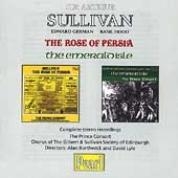In the 1980s, the Prince Consort group of Edinburgh recorded nearly all of the Sullivan-without-Gilbert operas. After the success of their Beauty Stone, they put on a concert performance of Sullivan's last opera, The Emerald Isle, which was completed by Edward German. The performance by the Prince Consort is just acceptable. While the orchestra is generally good (and are many of the soloists), the chorus is the muddiest chorus that the PC has recorded. A perfect example of this is the double chorus "That we're soldiers, no doubt, you will guess"; another one is the waltz "I cannot play at love". The men get absolutely buried by the others in both numbers and are almost inaudible. At other times, they are a good chorus (the opening of both acts, for instance), although the material seems to be a challenge all around.
I want to point out that many people find fault in Richard Bourjo's performance of Professor Bunn, because he is a bass and not a baritone. (This apparently spoils his 'Hassan' in their Rose of Persia as well.) I think it is an acceptable performance, and though I too would have preferred a lighter voice, it is not a bad choice in many of the numbers. The only time I think this really seems to hinder Bourjo is during the "Sing a rhyme" concerted piece, where he is just too heavy for the part. On the other hand, his "Song of the Devonshire men" is excellent.
All of the soloists are good, particularly Thomson (as Murphy), Timmons (as Rosie) and Smart (as the Countess). Having heard the PC's recording of The Chieftain, I wish that Smart could have performed Inez; she sings her only aria, "When Alfred's friends", with control and personality, something that she could have conveyed in playing Inez. (Alas, what might have been!)
The re-release on Sounds on CD has a narration that links the songs together, while the LP recording does not have the narration. This recording of The Emerald Isle is the only one that's commercially available, but it fails to show off all the charms of the opera, due to the muddy chorus, funereal tempos, and the popular sentiment of Bourjo's performance.

